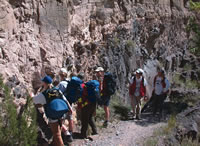 Laurentian University’s Mineral Exploration Research Centre (MERC) and the Department of Earth Sciences have spearheaded the introduction of two new Geology programs to help address a serious shortage of geoscientists.
Laurentian University’s Mineral Exploration Research Centre (MERC) and the Department of Earth Sciences have spearheaded the introduction of two new Geology programs to help address a serious shortage of geoscientists.
A co-op Bachelor of Science option was launched this year, and a collaborative graduate curriculum based on modular courses at universities throughout Ontario is under development.
The idea for the collaborative graduate program evolved from a successful series of modular courses offered at Laurentian University beginning in the late 1990s.
“There are fewer and fewer professors who teach Economic Geology in Ontario and the number of courses offered to students is very limited,” said Dr. Harold Gibson, Director of MERC and a professor of vulcanology and ore deposits. “This enables students to be exposed to more courses.
“If you are the only Economic Geology graduate student at a university, there’s no one to interact with. It used to be that you’d have enough students in a particular research area for that type of interaction, but in many schools, there’s not.”
The curriculum consists of seven courses – five at Laurentian and two at the University of Ottawa - but Gibson hopes other universities will come on board. The courses currently attract graduate students from Ottawa, Queen’s, the University of Toronto, the University of Western Ontario, Waterloo University and Laurentian.
Each course runs for up to two weeks and is “team-taught” by lecturers from universities in Ontario, across Canada and internationally, as well as researchers from the Geological Survey of Canada and the Ontario Geological Survey.
Courses currently offered focus on magmatic ore deposits, volcanic terrains, geochemistry, geophysics, hydrothermal deposits, quantitative methods, and structure and tectonics.
Mining companies have also been taking advantage of the courses to upgrade the skills of their geologists.
“The combination of students and industry geologists is great for the students because they get to interact with their peers in industry,” said Gibson. “They make good contacts and get a different perspective because they’re learning with geologists who have been in the field and working for years.”
The courses often attract 30 or more students.
Financial support from Natural Resources Canada’s Targeted Geoscience Initiative and the Sudbury-based Centre for Excellence in Mining Innovation allow MERC to offer graduate students stipends of up to $700 to offset their travel and accommodation costs.
Gibson would also like to see the mining industry and the Ontario government step up to the plate.
“We think the mining industry could be persuaded to fund this because they’re going to get better trained geoscientists, and the Ontario government should look at this as a way to maximize the talents we have. We’re all within driving distance of each other. We have an incredible amount of expertise, but we’re not using it. The most efficient use is to get us to collaborate. We can’t live in silos anymore. We can’t educate in silos and we can’t do research in silos.”
Plunging enrolment and the decreased emphasis on Geology programs in universities came about as a result of the mining industry slump through the ’90s. Mining companies laid off geologists, students shied away and universities shifted to more environmentally oriented programs, said Gibson.
“There were more research grants and funding available for environmental programs, so universities encouraged their departments to move in that direction, but now they’re beginning to realize that there’s a need for economic geologists, so we’re seeing Ottawa, Carleton and other universities moving to regain their stature in this area.”
Enrolment
Enrolment at the undergraduate level is increasing, but graduate students are more difficult to attract because of the competition from mining and exploration companies.
“Undergraduates are being snapped up by industry as soon as they graduate,” said Gibson. “Very few are going on to do graduate work because it’s so lucrative to go out and work right now, so we’re seeing an increase in undergraduate enrollment, but we’re struggling to keep our graduate students.”
A properly funded and promoted collaborative graduate program combining the academic expertise of several universities would be one way to attract graduate students to Ontario, he suggested.
The next steps are to expand the number of courses offered, include more universities in the program and secure long-term funding.
The co-op undergraduate program is open to second year Honours Geology Bachelor of Science students from any Canadian university, and includes three staged summer work terms. Following completion of the second year of study, students spend a summer learning mapping skills in the field with either the Geological Survey of Canada or the Ontario Geological Survey. The second work terms is spent with a mining or exploration company doing mapping and drill-core logging. In their third work term, students are assigned to a mining company to obtain hands-on experience in underground mapping, exploration and ore reserve estimation techniques.
Laurentian accepted three students into the inaugural year of the co-op program, but enrollment is expected to grow to 10 or more students as it’s promoted to students across the country.
“The co-op program is unique because we put as much emphasis on designing the work terms as we do designing the course,” said Gibson. “We think it’s going to give them an edge when they graduate and will give industry a better geologist.”
Laurentian’s Department of Earth Sciences has a reputation as being one of the premiere hard rock geology programs in Canada, said Gibson.
The department includes Dr. Balz Kamber, Canada Research Chair in Precambrian Geology, who heads up one of the best laboratories in the world for trace elements; Dr. Michael Lesher, an NSERC research chair in Economic Geology; a new chair in exploration geophysics; and plans for a chair in exploration geochemistry.


.jpg;w=120;h=80;mode=crop)